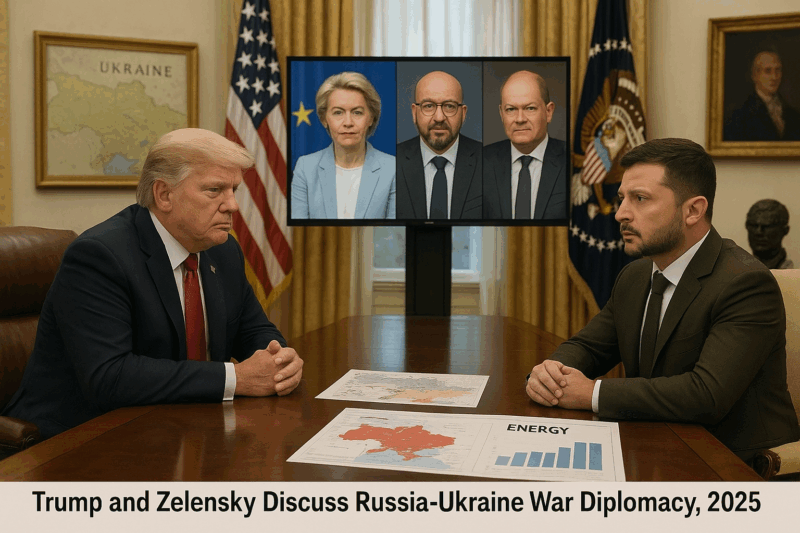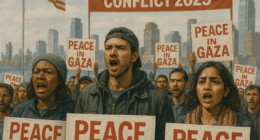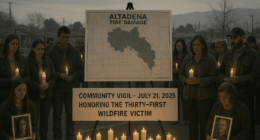A Stalled Path to Peace in Ukraine
Three weeks after a high-profile summit in Alaska, the quest for peace in Ukraine remains mired in diplomatic stagnation, with President Donald Trump and Russian President Vladimir Putin casting blame on Europe for the deadlock. On September 4, 2025, Trump urged European leaders to escalate economic pressure on Russia and China, highlighting their continued purchase of Russian oil as a key obstacle. This alignment with Putin’s narrative reveals a complex and often contradictory U.S. approach to the Russia-Ukraine war, leaving Ukrainian President Volodymyr Zelensky and European allies scrambling to secure meaningful progress.
Human Toll of the Ongoing Conflict
The prolonged impasse in peace talks weighs heavily on Ukraine’s people. Since Russia’s 2022 invasion, over a million lives have been lost or wounded, including thousands of civilians. Families in cities like Kyiv and Lviv endure relentless drone and missile strikes, with a recent attack on August 27 killing 19, including four children. Ukrainian schools, like one in Bobryk, have moved classes to basements to protect students during air raids, disrupting education and normalcy. For Zelensky, the pressure to negotiate without conceding sovereignty is immense, while European citizens face rising energy costs tied to sanctions, amplifying the war’s ripple effects.
Facts and Figures of the Diplomatic Standoff
On September 4, Trump spoke with Zelensky and European leaders, emphasizing that Europe’s €1.1 billion in Russian fuel purchases in 2024 fuels Moscow’s war machine. EU oil imports from Russia dropped to $1.72 billion in Q1 2025 from $16.4 billion in Q1 2021, reflecting a maritime export ban, yet some nations like Slovakia and Hungary persist. Trump’s call echoed Putin’s narrative, who met Slovak Prime Minister Robert Fico in Beijing, dismissing European fears of Russian aggression as “hysteria.” Putin’s offer to host Zelensky in Moscow was rejected as untenable, and no bilateral meeting has materialized despite White House optimism two weeks prior. Russia’s recent capture of Kamyshevakha and Novoselovka underscores its battlefield momentum.
Broader Context: Geopolitics and Energy Dynamics
The Russia-Ukraine war intersects with global power plays, particularly China’s role. Trump’s tariffs on India for buying Russian oil (50% on exports) strained U.S.-India ties, pushing Prime Minister Narendra Modi closer to China’s Xi Jinping at the Shanghai Cooperation Organisation summit. Putin, bolstered by Xi and North Korea’s Kim Jong Un, exploits Western disunity, accusing Europe of undermining diplomacy. Historically, Russia’s 2014 annexation of Crimea set a precedent for its territorial ambitions, while NATO’s cohesion is tested by Trump’s reluctance to sanction China and his alignment with Putin’s rhetoric. The war’s economic toll—rising global energy prices and supply chain disruptions—highlights the stakes of this diplomatic quagmire.
European Efforts and Russian Resistance
The “Coalition of the Willing,” led by France’s Emmanuel Macron, pledged contributions from 26 nations for a potential peacekeeping force, but Russia deems foreign troops “legitimate targets.” Zelensky insists on security guarantees during, not just after, the war, rejecting a proposed U.S.-monitored buffer zone as insufficient. Russia’s GPS jamming of a European Commission plane in Bulgaria further escalates tensions.
What Lies Ahead: A Fragile Path Forward
The stalled talks signal a need for renewed diplomatic vigor. Trump’s vague threats of “consequences” for Putin lack teeth, as sanctions remain off the table and U.S. military support faces cuts under Section 333 in 2026. Europe’s push for security guarantees offers hope, but Putin’s battlefield gains and alliances with China complicate prospects. Globally, the crisis underscores the challenge of balancing economic sanctions with energy realities, urging leaders to prioritize Ukraine’s sovereignty and civilian safety over geopolitical posturing.
Conclusion: A War Far from Resolution
As Trump and Putin point fingers at Europe, the Russia-Ukraine war grinds on, leaving Zelensky to navigate a treacherous diplomatic landscape. The failure to secure a Putin-Zelensky meeting, coupled with Russia’s aggressive tactics, dims hopes for peace. With civilians bearing the brunt, the world watches as the Trump-Putin alignment on blaming Europe risks prolonging a conflict that demands urgent, unified action.






